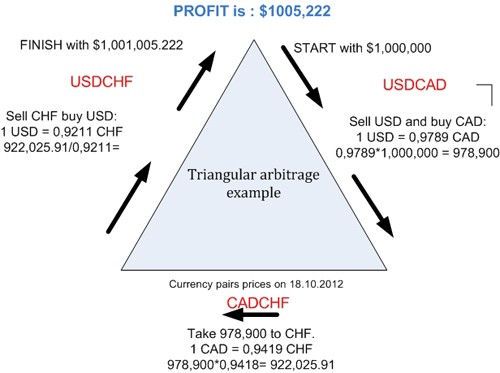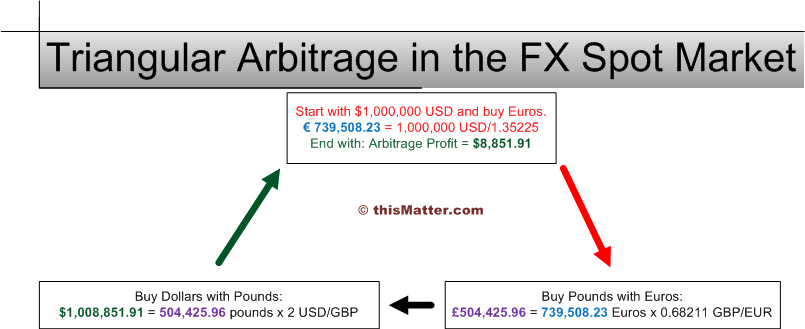Arbitrage Definition Example
Post on: 30 Май, 2015 No Comment

What it is:
Arbitrage is the process of exploiting differences in the price of an asset by simultaneously buying and selling it. In the process the arbitrageur pockets a risk-free return. Differences in prices usually occur because of imperfect dissemination of information.
How it works/Example:
For example, if Company XYZ’s stock trades at $5.00 per share on the New York Stock Exchange (NYSE) and the equivalent of $5.05 on the London Stock Exchange (LSE), an arbitrageur would purchase the stock for $5 on the NYSE and sell it on the LSE for $5.05 — pocketing the difference of $0.05 per share.
Theoretically, the prices on both exchanges should be the same at all times, but arbitrage opportunities arise when they’re not. In theory, arbitrage is a riskless activity because traders are simply buying and selling the same amount of the same asset at the same time. For this reason, arbitrage is often referred to as riskless profit .
Arbitrageurs also try to exploit price differences created by mergers. In some cases, they purchase the shares of companies that are the targets of purchase offers, hoping to pocket the difference between the trading price and the eventual cash payment resulting from the merger. Even though this type of strategy is referred to as arbitrage, it’s a bit of a misnomer because there’s always a risk that a merger will not actually happen. Because it’s not risk-free, merger arbitrage is not arbitrage in its truest sense.
Why it Matters:

Only large institutional investors and hedge funds are capable of taking advantage of arbitrage opportunities. Because they’re able to trade large blocks of shares. they can pocket millions in arbitrage profits even if the spread between two security prices is small (and it usually is just pennies).
By contrast, individual investors typically don’t have the large sums of money needed to take advantage of arbitrage opportunities, and trading fees would eat up any profits an individual arbitrageur hoped to secure. Institutional investors aren’t burdened by these same limitations.
Of course, small investors and entrepreneurs take advantage of much smaller arbitrage opportunities every single day. For example, if you’ve ever purchased a bargain-priced item at a garage sale or flea market. and then sold that item for a higher price on eBay, then you’ve profited from a form of arbitrage.
The main creator of arbitrage opportunity used to be a lack of real-time communication about prices in other markets, but modern technology has reduced the number of arbitrage opportunities out there. The relatively few arbitrage opportunities that do exist are elusive and don’t last for long — when people realize that a security is cheaper in one market than another, their interest in exploiting the opportunity will drive up the price of the cheap security and drive down the price of the expensive security until there is no longer a price difference. In this manner, arbitrage does a good job of ensuring equilibrium in the markets.














